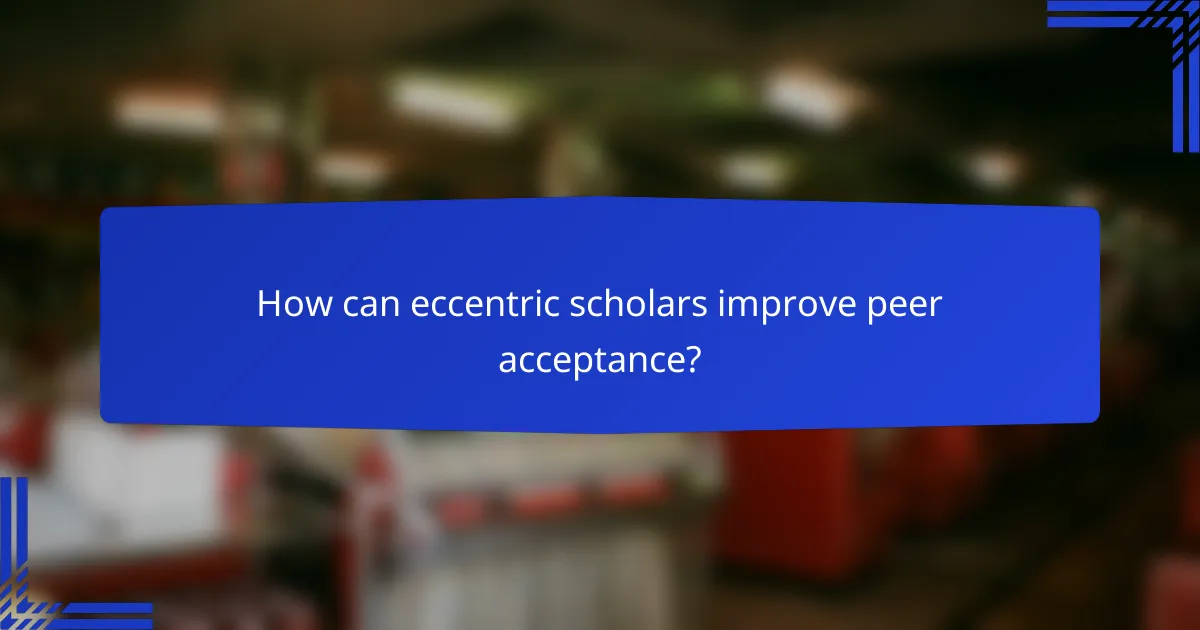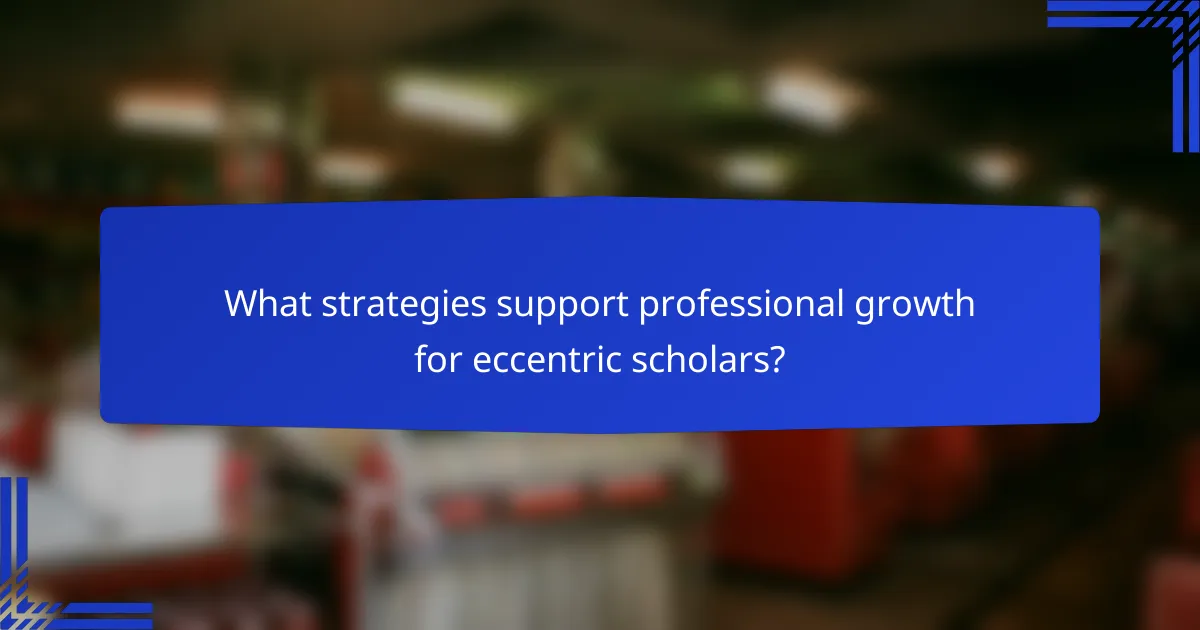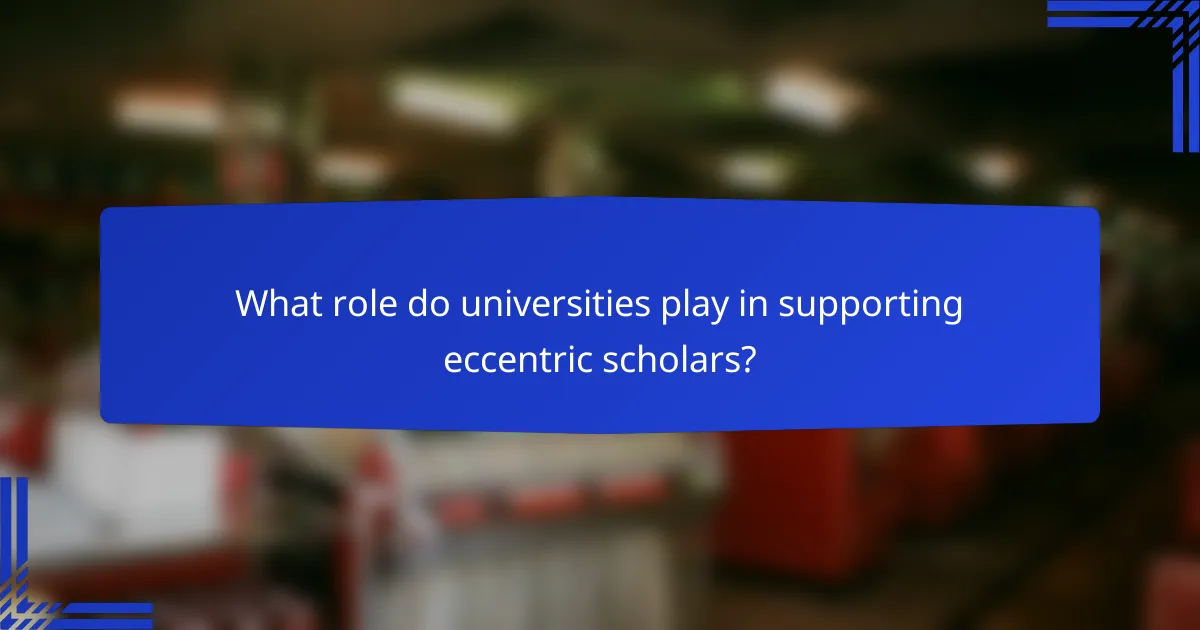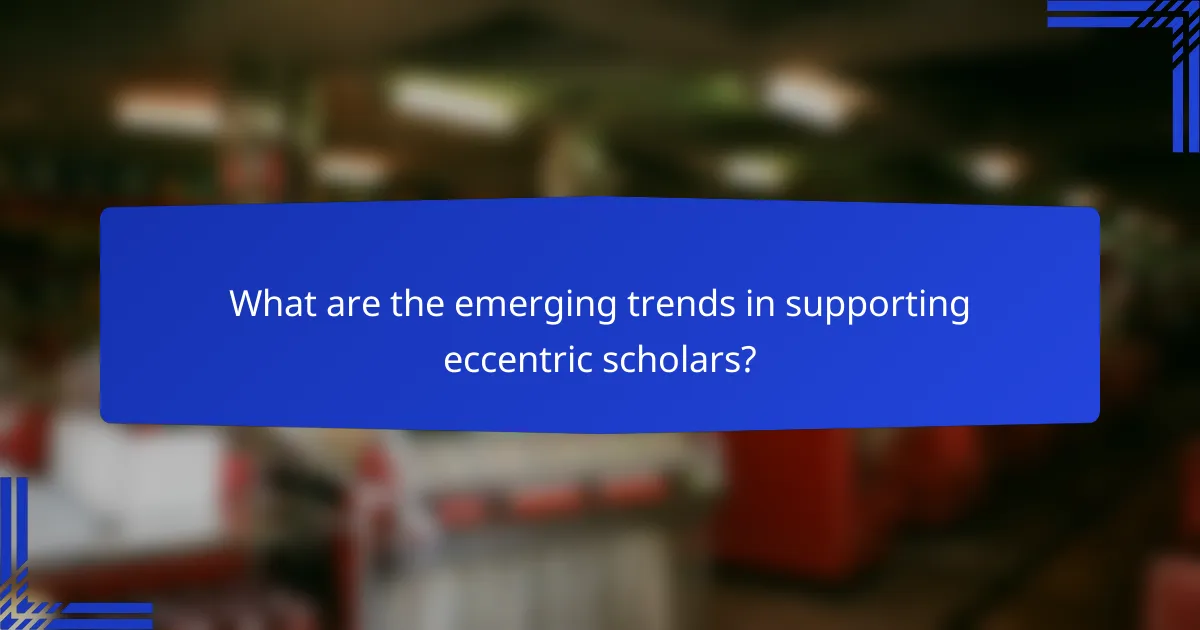Eccentric scholars often face distinctive academic challenges that can impede their professional growth and acceptance among peers. These challenges range from isolation within traditional academic circles to difficulties in securing funding and navigating institutional structures. By actively engaging with their communities and leveraging their unique perspectives, these scholars can foster peer acceptance and enhance their professional development.

What academic challenges do eccentric scholars face in Canada?
Eccentric scholars in Canada often encounter unique academic challenges that can hinder their professional growth and peer acceptance. These challenges include isolation from mainstream academic circles, difficulty in securing funding, struggles with traditional research methodologies, balancing personal interests with academic expectations, and navigating institutional bureaucracy.
Isolation from mainstream academic circles
Eccentric scholars frequently find themselves isolated from conventional academic communities. Their unconventional ideas or approaches may not align with the prevailing norms, leading to a lack of support and collaboration opportunities.
This isolation can result in fewer networking opportunities, which are crucial for career advancement. Engaging in niche conferences or online forums can help mitigate this issue by connecting like-minded individuals.
Difficulty in securing funding
Securing research funding can be particularly challenging for eccentric scholars due to their unconventional projects. Traditional funding bodies often prioritize mainstream research topics, leaving innovative ideas underfunded.
To improve funding prospects, scholars should consider alternative funding sources such as private foundations or crowdfunding platforms that support unconventional research. Tailoring proposals to highlight the potential impact of their work can also enhance their chances of success.
Struggles with traditional research methodologies
Eccentric scholars may struggle with traditional research methodologies that do not align with their innovative approaches. This can lead to frustration when attempting to fit unique ideas into established frameworks.
Adopting mixed methods or interdisciplinary approaches can provide more flexibility. Scholars should seek mentorship from those experienced in innovative research to navigate these challenges effectively.
Balancing personal interests with academic expectations
Finding a balance between personal interests and academic expectations can be difficult for eccentric scholars. They often feel pressured to conform to traditional academic standards while wanting to pursue their unique passions.
Establishing clear goals and prioritizing projects that align with both personal interests and academic requirements can help maintain this balance. Time management strategies, such as setting specific deadlines for personal projects, can also be beneficial.
Navigating institutional bureaucracy
Institutional bureaucracy can pose significant challenges for eccentric scholars, as they may encounter rigid policies and procedures that stifle creativity. This can lead to delays in project approvals and hinder research progress.
Understanding the institutional landscape and building relationships with key administrative personnel can ease navigation through bureaucracy. Additionally, advocating for more flexible policies that support innovative research can foster a more conducive environment for eccentric scholars.

How can eccentric scholars improve peer acceptance?
Eccentric scholars can enhance peer acceptance by actively engaging with their academic communities and demonstrating the value of their unique perspectives. Building relationships through collaboration, visibility, and communication is essential for fostering understanding and acceptance among peers.
Engaging in interdisciplinary collaborations
Interdisciplinary collaborations allow eccentric scholars to connect with peers from different fields, broadening their perspectives and enhancing their research impact. By working with others, they can showcase how their unconventional ideas contribute to various disciplines, making them more relatable and accepted.
To initiate collaborations, scholars should identify potential partners whose work aligns with their interests. Attending workshops or seminars outside their primary field can also provide networking opportunities. A successful collaboration often leads to co-authored papers, which can increase visibility and credibility.
Participating in academic conferences
Attending academic conferences is a vital way for eccentric scholars to present their work and engage with peers. These events offer platforms for sharing innovative ideas, receiving feedback, and building professional relationships. Participation can also lead to invitations for future collaborations.
When attending conferences, scholars should prepare concise presentations that highlight the significance of their research. Engaging in discussions and networking during breaks can further enhance their visibility. It’s beneficial to focus on conferences that attract diverse audiences to maximize exposure.
Building a personal brand through social media
Establishing a personal brand on social media can significantly improve the visibility and acceptance of eccentric scholars. Platforms like Twitter, LinkedIn, and ResearchGate enable them to share their work, connect with others, and engage in discussions relevant to their fields.
To effectively build a brand, scholars should regularly post updates about their research, share insights, and interact with followers. Utilizing hashtags related to their niche can help reach a broader audience. However, it’s essential to maintain professionalism and authenticity in all communications.
Publishing in niche journals
Publishing in niche journals allows eccentric scholars to reach specific audiences that appreciate their unique perspectives. These journals often have dedicated readerships that are more open to unconventional ideas, facilitating greater acceptance within those communities.
When selecting journals, scholars should consider the journal’s scope, audience, and impact factor. Tailoring submissions to align with the journal’s themes can increase acceptance rates. Engaging with the editorial board and participating in peer reviews can also enhance their reputation within niche circles.

What strategies support professional growth for eccentric scholars?
Eccentric scholars can enhance their professional growth by leveraging unique strategies tailored to their distinct perspectives. Fostering connections, seeking guidance, and promoting innovative ideas are essential steps in navigating their academic journeys.
Networking with like-minded professionals
Building a network with like-minded professionals is crucial for eccentric scholars. Engaging with peers who share similar interests can lead to collaborative opportunities and support. Attend conferences, workshops, and seminars to meet individuals who appreciate unconventional approaches.
Consider joining niche academic associations or online forums where unique ideas are celebrated. These platforms can provide valuable insights and foster relationships that may lead to future collaborations or research projects.
Seeking mentorship from established academics
Finding a mentor among established academics can significantly benefit eccentric scholars. A mentor can offer guidance on navigating the complexities of academia, including publishing, funding, and career advancement. Look for mentors who value diversity in thought and encourage innovative research.
When approaching potential mentors, be clear about your research interests and how their expertise aligns with your goals. Establishing a strong rapport can lead to fruitful advice and opportunities for professional growth.
Developing unique research proposals
Creating unique research proposals is essential for eccentric scholars to stand out in their fields. Focus on topics that challenge conventional wisdom or explore under-researched areas. A well-crafted proposal should clearly articulate the significance of the research and its potential impact on the discipline.
Consider incorporating interdisciplinary approaches or innovative methodologies to enhance the proposal’s appeal. Engaging with current trends and societal issues can also make your research more relevant and compelling to funding bodies and academic committees.
Utilizing online platforms for visibility
Online platforms are invaluable for eccentric scholars seeking to increase their visibility. Academic social networks like ResearchGate or Academia.edu allow scholars to share their work, connect with others, and receive feedback. Regularly updating profiles with publications and research interests can attract attention from peers and potential collaborators.
Additionally, consider blogging or contributing articles to online journals to showcase your unique viewpoints. This not only enhances your online presence but also positions you as a thought leader in your area of expertise.

What role do universities play in supporting eccentric scholars?
Universities play a crucial role in supporting eccentric scholars by providing an environment that fosters innovative thinking and unconventional research. They offer resources, mentorship, and a community that values diverse perspectives, which are essential for the growth of unique academic pursuits.
Providing resources for unconventional research
Universities often allocate funding and facilities specifically for unconventional research projects. This can include grants for interdisciplinary studies, access to specialized equipment, or dedicated research centers that focus on niche areas. For example, a university might support a scholar researching alternative energy sources through financial assistance and lab space.
Additionally, universities may host workshops and seminars that encourage eccentric scholars to present their ideas and receive feedback. These platforms not only validate unique research but also help in refining concepts through collaboration with peers and faculty.
Creating inclusive academic environments
Creating inclusive academic environments is essential for the acceptance of eccentric scholars. Universities can implement policies that promote diversity in thought and background, ensuring that all voices are heard and valued. This can include mentorship programs that connect unconventional scholars with established academics who appreciate innovative ideas.
Furthermore, fostering a culture of openness and respect within academic settings helps reduce stigma around eccentricity. Encouraging interdisciplinary collaboration can also enhance acceptance, as scholars from different fields can find common ground and support each other’s unconventional approaches.

How can eccentric scholars leverage their uniqueness for career advancement?
Eccentric scholars can leverage their uniqueness by embracing their unconventional ideas and approaches to stand out in their field. By showcasing innovative research and diverse perspectives, they can enhance their professional growth and gain acceptance among peers.
Highlighting innovative research approaches
Innovative research approaches can set eccentric scholars apart from their peers. By exploring unconventional methodologies or interdisciplinary techniques, they can produce unique findings that attract attention. For example, integrating technology into traditional research can yield fresh insights and open new avenues for exploration.
To effectively highlight these innovative approaches, scholars should publish their work in niche journals or present at specialized conferences. Engaging with online platforms and academic networks can also amplify their visibility and foster connections with like-minded researchers.
Emphasizing diverse perspectives in academia
Diverse perspectives enrich academic discourse and can be a powerful asset for eccentric scholars. By sharing their unique viewpoints, they can challenge established norms and inspire new discussions. This can be particularly effective in fields that benefit from varied cultural or disciplinary insights.
To emphasize their diverse perspectives, scholars should actively participate in collaborative projects and interdisciplinary teams. Networking with professionals from different backgrounds can also enhance their understanding and help them articulate their ideas more effectively. Engaging in public speaking or community outreach can further showcase their unique contributions to a broader audience.

What are the emerging trends in supporting eccentric scholars?
Emerging trends in supporting eccentric scholars focus on fostering inclusive environments that embrace diverse thinking and unconventional approaches. This includes enhancing peer acceptance, expanding professional networks, and leveraging technology for collaboration and growth.
Growth of online academic communities
The rise of online academic communities has transformed how eccentric scholars connect and collaborate. These platforms provide spaces for sharing ideas, resources, and support, allowing scholars to engage with like-minded individuals regardless of geographical barriers.
Many online communities, such as ResearchGate and Academia.edu, facilitate networking and knowledge exchange. Scholars can join forums, participate in discussions, and access a wealth of research materials, which can enhance their visibility and professional growth.
To maximize the benefits of these communities, eccentric scholars should actively participate by sharing their work, seeking feedback, and connecting with peers. However, it’s essential to remain discerning about the quality of interactions and the credibility of information shared within these platforms.
